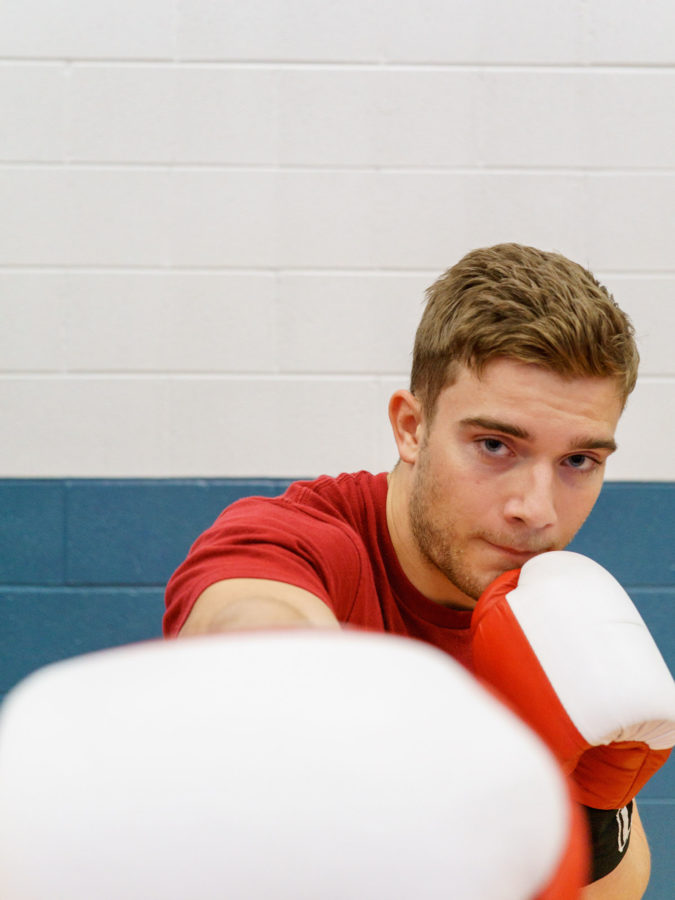Illini Boxing Club: More than physical fitness
September 15, 2015
Three minutes. That’s all you have to prove yourself in the ring. It’s just you and your opponent squared up and ready to punch out your differences.
On the University campus, students duke it out through the RSO: Illini Boxing Club. And for a few more weeks, the club is open to University students of all ages and levels.
Konstantinos Koiliaris, a graduate student in Computer Science who is also the club’s treasurer and secondary coach, said boxing unassumingly requires a broad range of skills beyond physical tact.
“Boxing is one of the sports that doesn’t seem like it on first sight,” Koiliaris said. “But it requires a lot of concentration and control of your feelings. I think in the long run, boxing has made me calmer and have better self-control (over) your emotions both inside the ring and outside because it requires discipline.”
Illini Boxing Club was founded in the fall of 2012 by Michael McDonough, senior in ACES, who started the club after seeing an absence of boxing among the other combat sports offered on campus.
Get The Daily Illini in your inbox!
“It’s more physical. It’s more demanding,” McDonough said. “(You have to) have the physical attitude to go in the ring.”
Three times a week, for two hours, the club meets for practice.
“We try doing three rounds of three minutes (of typical exercises) because the boxing rounds are three minutes. We try to have kind of the same thing like in a real competition,” said Krystian Jaronczyk, senior in Engineering.
McDonough said anyone can join, and most of the time, new members are interested in learning self-defense skills.
“Most people just want to learn how to defend themselves, especially at this University,” McDonough said. “They’re not going to want to be boxers.”
But the club also has a competitive team. Only seven boxers are chosen to compete out of the entire club, which typically has between 70 and 90 members, according to McDonough and Koiliaris.
“You have to be ready to fight because if you go in the ring, they’re gonna knock your head off. It’s violent. I’m not gonna throw you in the ring if you have no experience,” McDonough said. “I judge you if you’re ready or not, and if you’re not ready, I’m not gonna put you in. But if you work hard, you get into it.”
Though many people join the club for the exercise, others have discovered an unmatched passion for the sport, as did Koiliaris, who switched from martial arts to boxing seven years ago.
“One friend suggested a (boxing) gym when I was in Greece … I was hooked ever since,” he said. “The first time I got in the ring was a very interesting experience … You practice for it. You get up in the ring; you fight. But the first time that I actually had to do it, I realized that it’s you and some other person. The other person basically wants to hurt you, and you want to hurt them back. I think that was the first moment I realized that this is going to be exciting.”
But even though Koiliaris and his opposer were trying to hurt each other in the ring, he said he fears that audience members will form negative, violent stereotypes about the sport.
“I think a lot of people are scared of it. They think it’s a vulgar sport because there are people punching each other. In reality, it’s a lot more control and a lot more strategic than what it seems.”
In addition to outside perspectives of the sport, Nick Marr, senior in Engineering, said actually doing it opened his eyes to things he never noticed before just watching.
“So many things that you don’t think about when you’re just watching it,” he said. “You don’t think about all the footwork, all the processes that go behind it. So even though it’s very physical … (there’s) a lot of thinking and an instinct for it that I didn’t necessarily expect.”
McDonough said boxing has many mental benefits as well.
“(I’ve gained) more self pride. I don’t get down on myself. When I was little, I learned the hard way that you lose. It’s tough,” McDonough said. “But then you realize, you know what? I did decent. I’m learning. So it’s more just battling through things just like life: You get knocked down, but you get back up.”
Koiliaris said the discipline of boxing helps in every aspect of life — not just within the ring.
“If you box enough, there won’t be that many things in your life that will stress you out,” he said. “You know, public speaking, things like that, will all seem a lot less intimidating.”
McDonough encouraged everyone to give the sport a try if they are even remotely interested in a combat sport.
“Personally, I think it’s cool because you’re able to defend yourself. (That’s) kind of a cool practical aspect of it,” Marr said. “But when you first get into it you see guys who are so good at it and so quick. You don’t think that you can do it, but it’s kind of cool to be able to see how far you progress and try to keep up with them and push yourself.”







